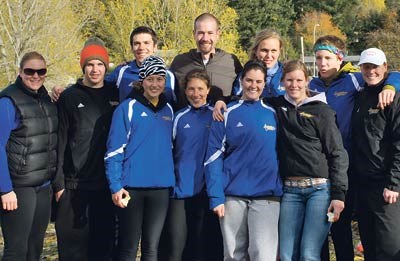With many small sport programs, the road to growth is often tied directly to the involvement of a handful of key, passionate individuals. For the fledgling rowing crew at Laurentian University, that stage was marked by the arrival of Amanda Schweinbenz.
Now in her fifth year at LU, both as a professor and volunteer coach with the student rowers, Schweinbenz brought with her a wealth of rowing knowledge, despite the fact that she did not pick up the water sport until the age of 15.
Born and raised in Hamilton, Schweinbenz, who teaches the Socio-Cultural Aspects of Sport with a particular affinity for sport history, spent her youth in a variety of athletic pursuits, most notably volleyball.
In her early teens, a serious knee injury forced her to look at other alternatives. As a result, a career spanning six years of university rowing, which covered her time at both Western and Victoria, was launched.
Arriving in Sudbury in 2006, Schweinbenz immersed herself immediately within the rowing community, both at the university as well as with members of the Sudbury Rowing Club.
While Laurentian did not field a varsity rowing team at the time, a Learn to Row program under the guidance of Charlotte Leonard and Shannon Hengen had been introduced. For Schweinbeinz, the next step seemed only natural.
“It was all about baby steps — let’s start a small team, do some development rowing, and go to some other small regattas,” Schweinbenz said.
Keeping Laurentian Athletic Director Peter Hellstrom in the loop every step of the way and recognizing the limited budget that existed, Schweinbenz and company became a “pay to play” sport.
From a starting point that saw her travel to a developmental regatta some four years ago with just two novice athletes, to competing at the OUA championships this fall with a crew of 15 varsity athletes, rowing has clearly made inroads at Laurentian.
Much like her own background, Schweinbenz acknowledged that a large percentage of the athletes with whom she works are “cross-over athletes” — former participants in another sport who are seeking a different challenge.
Still, there are physical prototypes more prone to success in the sport. “We are looking for tall, long limbs, because that means that you have long levers,” Schweinbenz explained.
Because the rowing community within Sudbury is, relatively speaking, a small one, the university program leans heavily on the support of those involved with the Sudbury Rowing Club in order to build the foundation of a competitive varsity racing club.
Likewise, Schweinbenz is quick to share her skill set with non-university students, having coached the competitive program for junior rowers at the Club this past summer.
With years of rowing experience at a variety of venues across the country, Schweinbenz said Sudburians don’t realize how good they have it at times.
“Lake Ramsey is fantastic,” she said. “You don’t just have one small section that you can row in. You can always find good water, and the lake is nice for rowing because we don’t have a lot of weeds.”
The lake is a venue that is beginning to be recognized beyond the city limits, as well. “When we had the Ontario Summer Games here (this summer), Row Ontario, the participants and the coaches raved about our course,” Schweinbenz said.
Still, her priority remains the newly formed varsity team, which competed officially under the Laurentian University banner at the OUA championships for the first time this year.
Schweinbenz said she has noticed a change along the way in her athletes.
“The athletes really stepped it up. They stepped up their commitment to the program, to each other and really agreed that they had to make an impact on the rowing community.”
And she is seeing the light at the end of the tunnel.
The lightweight doubles team of Emily Townend and Alison Burrell should contend for a medal next year, while Carling Zeeman has been identified through the Row Ontario core testing program (RADAR) — a program established to identify, track and monitor rowing athletes.
It’s more strokes in the right direction for a young program that has already come a long way.
Join Sudbury.com+
- Messages
- Post a Listing
- Your Listings
- Your Profile
- Your Subscriptions
- Your Likes
- Your Business
- Support Local News
- Payment History
Sudbury.com+ members
Already a +member?
Not a +member?
Sign up for a Sudbury.com+ account for instant access to upcoming contests, local offers, auctions and so much more.
